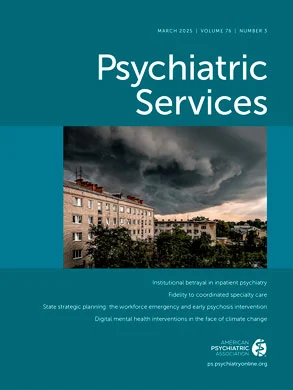In Reply: We appreciate the letters we received from occupational therapists about the broad scope of psychosocial occupational therapy. A common theme throughout the letters was best exemplified by Ms. Bair's comment that we "cast an unwarranted negative light on occupational therapy."
The study's intent was not to compare the entire practice of occupational therapy with skills training. Rather, it was designed to contrast the addition of a single modality—community re-entry skills training—with the customary care received by individuals with acute illnesses who were hospitalized in a public psychiatric facility. From such a specific study it would be reductionistic for any reader to conclude that occupational therapy as a discipline is less effective than a limited application of modularized skills training. Moreover, far from denigrating occupational therapists, we incorporated them into the skills training enterprise, and they served very capably as skills trainers.
A valid criticism in all three letters was that we did not fully describe the treatment received by the group randomized to the occupational therapy condition. We should have emphasized that we called it the occupational therapy group because, first, that is what the inpatient facility calls the structured activity in which the clients are engaged while the community re-entry group receives skills training and, second, because the individuals who administer these activities have degrees in occupational therapy. However, it has become clear to us that occupational therapy means different things to different people. Thus it is important to clarify that the occupational therapy modality used as the control group for this study could be described as expressive arts and crafts.
We are delighted that Dr. Cook is aware of the body of research that has documented the utility of the skills training approach for individuals with schizophrenia, but unfortunately very few patients with serious mental illness actually receive any type of skills training. However, they do receive services from occupational therapists. Until skills training becomes "customary occupational therapy practice" as suggested by Dr. Cook, then intervention-researchers such as ourselves will construe occupational therapy to be the approach we observe in settings such as the hospital where we conducted the study. We expect that the inclusion of skills training into customary occupational therapy would enhance and broaden the clinical outcomes of individuals with mental illness.
In response to Ms. Rebeiro's concerns, it is most certainly not a stretch of the imagination to suggest that there was a relationship between skills training and initial attendance at the aftercare clinic or that initial attendance is evidence of the educational objective of the community re-entry program. The implications of causality made in randomized, controlled clinical trials follow directly from the logic of experimental methodology.
Moreover, the material included in the community re-entry module was selected on the basis of previous research demonstrating that factors such as the client's acceptance of his or her need for treatment and medications or for making contact with the aftercare facility were associated with higher attendance rates for aftercare appointments. Therefore, the community re-entry module has both content and face validity.
Second, we did assess clients for discharge location, family involvement, and linkage to case management, which were included among the demographic and clinical history variables. As stated in the article (page 1315), the groups demonstrated no statistically significant differences on any of these variables.
Finally, aftercare attendance of clients was elicited from the records in the management information system of the Los Angeles County Department of Mental Health, which is the official system for recording the dates and locations of all visits and, as such, was the standardized format for reporting.
In summary, we encourage the development, refinement, and empirical validation of interventions conducted by occupational therapists for improving the social, vocational, and independent living skills of persons with disabling forms of mental disorders. We hope that our study has contributed to this impetus, which will greatly benefit the clinical outcomes of our clients.

